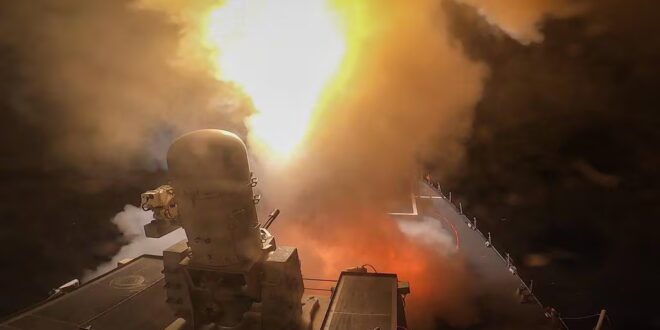The sailors aboard the USS Carney, based in the Red Sea, had a busy weekend — one that could have just as easily turned deadly were it not for the professionalism demonstrated on the ship.
On Sunday, the Yemen-based Houthi group launched four attacks on international vessels transiting the waterway. Some of the ships were slightly damaged by ballistic missiles fired from Houthi-run areas of the country. The USS Carney not only witnessed some of the attacks but also shot down three drones in self-defense as it was responding to a distress call from the civilian ships. The entire episode lasted about five hours in what U.S. Central Command, the U.S. military headquarters in the Middle East, called “a direct threat to international commerce and maritime security.”
This isn’t the first the Houthis, the de facto authorities in Yemen, have flexed their military muscle. The rebel army has periodically fired missiles and launched drones toward Israel, ostensibly in solidarity with Hamas, which is the target of a fierce Israeli military offensive in Gaza. On Nov. 8, the Houthis shot down a U.S. MQ-9 Reaper drone flying off Yemen’s coast. And on Nov. 26, two ballistic missiles were fired from Houthi territory in the vicinity of the USS Mason, another U.S. warship.
A few thousand miles away in Syria and Iraq, the roughly 3,400 U.S. troops based in both countries continue to be on high alert as militia rockets and drones harass their positions. There have been more than 70 such attacks since Oct. 17, prompting President Joe Biden’s administration to retaliate at times with precision airstrikes. The most recent U.S. retaliation occurred over the weekend, when a U.S. airstrike in Iraq killed five militants who were preparing to conduct another drone attack against U.S. facilities. The Iraqi government, which the U.S. supports militarily and diplomatically, has denounced similar U.S. strikes in the past as a violation of Iraqi sovereignty.
All of this activity is taking place as the 2-month-old war between Israel and Hamas resumes after a short-lived humanitarian truce created a pause in the fighting and allowed for the trading of Israeli hostages for Palestinian prisoners. That arrangement fell apart. With resumption of the fighting, there is more mass displacement in Gaza, and additional civilians have been killed. U.S. officials are likely anticipating more drone, rocket and missile attacks on American assets in the Middle East now that the pause is over, increasing the prospect that an American service member will eventually be killed. This is a terrifying scenario for an administration whose priority thus far has been to contain the war in Gaza from spiraling into a regional conflagration.
As you might expect, Biden has his critics. Some, particularly hawkish Republican lawmakers, have all but accused the White House of complacency as Iranian-linked proxies take shots at U.S. troops on land and U.S. sailors at sea. They’re flabbergasted that Biden isn’t taking harsher action against the militias and even more dumbfounded that he’s petrified of painting a bull’s-eye on Iran’s head. For many of these critics, Iran is ultimately the reason why the region is in such tumult. The answer in their minds: Get tougher with Iran.
“I would … send a clear message to Iran (that) if these attacks don’t stop immediately, then we will begin to threaten their assets,” Republican U.S. Sen. Tom Cotton of Arkansas said during a Nov. 26 segment on Fox News. Sen. Lindsey Graham, a Republican from South Carolina, was just as emphatic a week later on CNN: “I would put more pressure on Iran. Hamas doesn’t exist without Iranian help. … I would go to Iran and say, ‘Listen, you need to tell Hamas to let these hostages go. If you don’t, you’re going to start paying a heavier price.’”
Do these lawmakers have a point? Is Iran behind every act of violence in the Middle East, as these senators seem to suggest?
If only it were that simple.
There’s no disputing that Iran supports many of these nonstate actors militarily and diplomatically. The Houthis, for example, wouldn’t have the capability to send medium-range ballistic missiles and drones toward Israel or U.S. Navy ships if it weren’t for Iranian technological assistance. United Nations investigators have found elaborate Iranian weapons smuggling networks into Yemen, which funnel everything from small arms to missile components. Iraqi Shia militia groups, some of which have been incorporated into the Iraqi army, have extensive relationships with Tehran, so much so that many foreign policy experts presume they are direct arms of the Iranian state.
Yet just because the Iranians arm, fund and exert influence with all of these groups doesn’t necessarily mean Iran has direct command-and-control over them. This isn’t to make excuses for Iran; it’s to illustrate that client-proxy relationships are complicated affairs, even to the clients and proxies themselves. Indeed, history is full of examples of proxies ignoring advice from their benefactors and making their own decisions. The Houthis, for instance, decided to invade the Yemeni capital despite Iran advising them to hold off. Hamas, commonly regarded as an Iranian proxy, attacked Israel on Oct. 7 without the Iranian government having a clue about the operation.
The United States has had trouble with its own proxies as well. The Afghan government, the recipient of hundreds of billions of dollars in U.S. taxpayer money, frequently dismissed Washington whenever it urged Kabul to crack down on corruption within its ranks. U.S.-supported rebels in Syria early in the civil war had their own interests, preferring to fight Syrian dictator Bashar Assad instead of the Islamic State.
Why does any of this matter? Because sound U.S. policy can be formulated only with accurate information. Commonly held assumptions and emotionalism are terrible replacements.
 Eurasia Press & News
Eurasia Press & News




